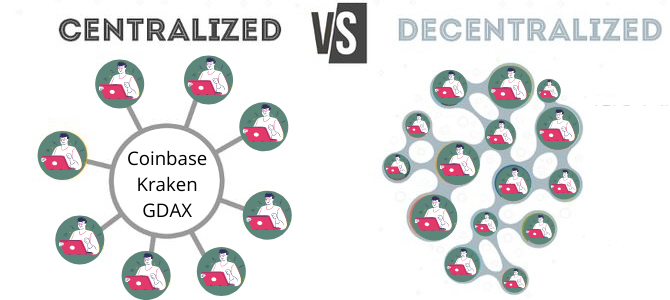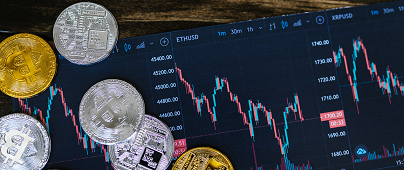Decentralized Vs Centralized Exchange
Trading a cryptocurrency needs a cryptocurrency exchange. And what is a cryptocurrency
exchange?
A place where an individual can buy and sell cryptocurrencies. It is digital currency
exchange, trade that permits customers to trade digital cryptocurrencies for other
assets, for example a fiat currency and other cryptocurrencies.
Then comes the two cryptocurrencies exchange i,e. Centralized and Decentralized.
In simple terms Centralized exchanges are the one having an owner, who manages it, and
has a team.
Whereas Decentralized exchanges, we can only manage our funds independently. Eg. trust
wallet.
Points listed below play an important role when it comes to Decentralized vs Centralized
exchanges.
- Funds control
- Security
- UI feature/interface
- Support center
- Privacy
- Trading Volume
- Buy/Sell currencies
- Trader Identity
- Trading Fee
- Censorship
Centralized exchanges (CEX)
Centralized exchanges are the corporations that work side by side with cryptocurrency
trading on a wide ranging scale, using a similar enterprise model to traditional asset
exchanges such as stock exchanges.
Centralized exchanges have high volume and are traded in huge quantities. You can buy
cryptocurrencies with this exchange. There are third party monitors and it secures the
transaction on behalf of the user. In centralized exchange deals can’t be tracked by the
blockchain system. Users need to provide personal information prior use, for
verification, like personal or organizational corporate info. Here users get higher
withdrawal quota along with technical customer support, if stuck in any technical issue.
Pros of Centralized Exchanges
- Have an order book, through which you can buy or sell your crypto currencies.
- Trade can be carried out using countries fiat currency. eg.Wazirx
Can do margin trading, future trading, stop loss can be sent, can place limit
orders and many more.
- Ease of use, have a simple interface, the UI system is quite manageable.
Forgot password? The account can be recovered with the help of customer support.
- Personal support - Help center-gives user advance support from the operating
personnel, issues and errors can be solved.
- Have high trade volume, with high liquidity, double trading, fiat to crypto
exchanges.
- Have options of credit card, debit, b2b trading.
Cons of Centralized Exchanges
- Have a KYC system - Need to go through the documentation process, carrying out the
sharing of personal information before use.
- Hacking, the biggest threat - exchanges can get hacked effortlessly. Not immune to
hacking.
- Limited privacy and security - Lack of privacy, the owner can misuse the account.
Your money is in control of the authority. Threat to data, can get leaked.
- Data is stored in the server, no anonymity, fear of getting banned as with a
country's fiat currency.
- Trading fee on every transaction/trade i.e. buying and selling.
Decentralized exchanges
Decentralized exchanges are cryptocurrency exchanges, allowing direct p2p cryptocurrency
trade, to occur online safely without any need of a mediator.
Pros of Decentralized Exchanges
- No need for documentation.
- Are highly secured, no fear of information leaking.
- We are the owners, and have a private key.
- Funds can’t get misused.
- No personal details needed, or sharing of data, no data required for verification.
- Smart contracts can be used to buy another currency.
- Highly Secure- Difficult or impossible to hack.
- Anonymity - Anonymous trading, just connect wallet.
- No trading fee, or less.
- No third party intervention permits peer to peer exchanges.
- For long term goal trading, it is the best platform.
Cons of Decentralized Exchanges
- Limited trading.
- Less capital being provided for trading.
- Lack efficiency of fast services compared to centralized.
- High gas fee.
- No basic feature of personal support, less convenience in help support centers.
- Low trade volume.
- Limited to crypto to crypto exchanges.
- Liquidity provider fee and low liquidity.
- Interfaces are difficult to use.

What to go for Centralized or Decentralized
Below distinguished points will give a more clear overview.
| Points |
Centralized Crypto Exchange |
Decentralized Crypto Exchange |
| Security |
Lacks security measures, threat to hack |
Highly Secured, nearly impossible to hack |
| Reputation |
Accepted almost everywhere |
Still making its place |
| Features |
Offers wide range of attributes |
Have less features to offer |
| Liquidity |
High |
Low |
| Speed |
Execution of orders are swiftly done |
Takes longer for execution of orders |
| Regulation |
Follow obedience. Requires licensing from authority |
Less ease in regulation. No licensing required by any authority |
| Control |
Platform or corporation have control |
Control of exchanges are in hand of user |
| Fees |
Fees on every transaction |
Minimal to no fee |
Beginners should go for centralized currency exchanges due to ease of use.
Experts will go for decentralized funds, funds can be stored safely in decentralized
exchanges. Think before investing the money over both platforms. Choose the one you
find convenient.







People Comments
Mark Robbinvt
June 19, 2019Very interesitng article. I must say your insights munc rhoncus felis eget nulla aliquet id fermentum est ucibus estibulum mcorper hendrerit.
replyJack William
June 19, 2019Couldn’t agree more Mark. It’s a must read for someone looking to understand the whole process.
replyMark Robbin
June 19, 2019Very interesitng article. I must say your insights munc rhoncus felis eget nulla aliquet id fermentum est ucibus estibulum mcorper hendrerit.
reply